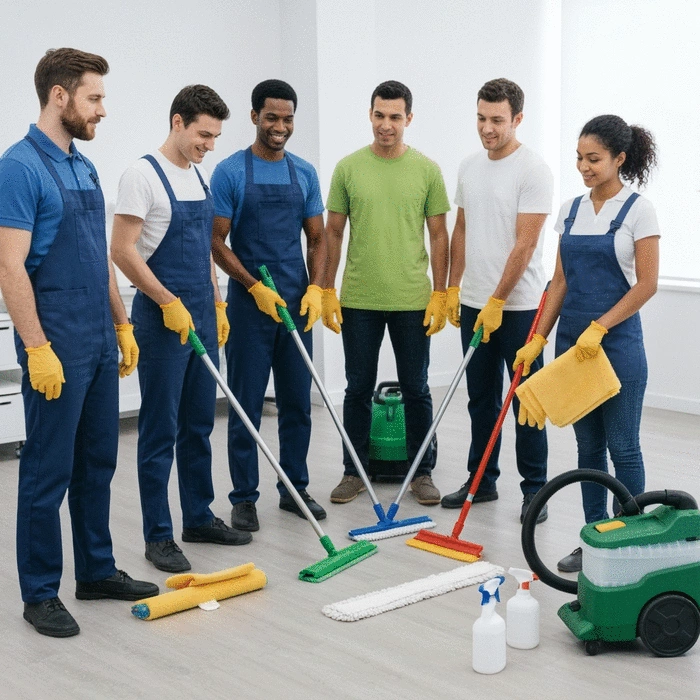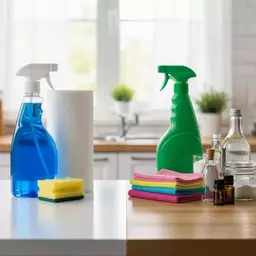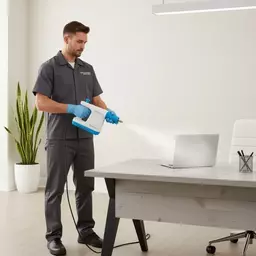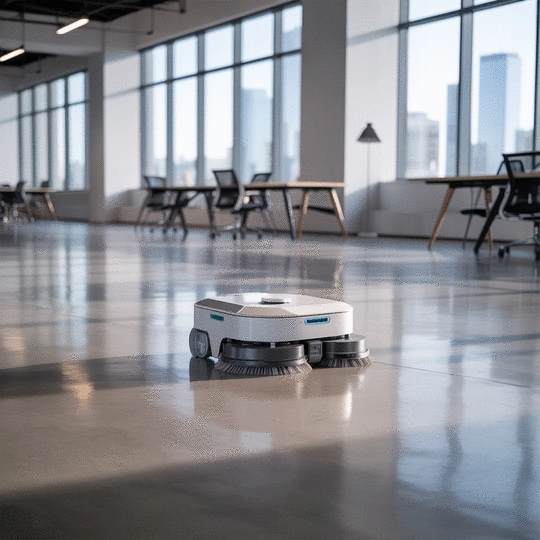Essential Skills for Cleaning Training

Posted on: 2025-10-30
By: Catherine W. Devereux
Effective staff training is not just a checkbox for compliance; it's a strategic investment that cultivates a more efficient, safer workplace. The insights from this article are invaluable for any organization looking to elevate their cleaning standards.
What You Will Learn
- Investing in staff training enhances service quality, leading to increased client satisfaction.
- Well-trained cleaning teams demonstrate improved morale and reduced turnover rates, which saves costs on recruitment.
- Aligning training with industry standards ensures compliance with health and safety regulations, protecting your business from liabilities.
- Customized training programs that address specific needs lead to better retention of skills among staff.
- Setting measurable goals using the SMART criteria can effectively track training outcomes and areas for improvement.
- Incorporating certification programs into staff development enhances the credibility and expertise of your cleaning team.
Driving Excellence: The Impact of Commercial Cleaning Staff Training
Investing in comprehensive training for commercial cleaning staff yields significant benefits across service quality, operational efficiency, and overall business success.
Why Effective Training Matters
- ✓ Improved service quality & standardized practices
- ✓ Enhanced team morale & job satisfaction
- ✓ Reduction in accidents & workplace injuries
Key Benefits of Investing in Training
- ✓ Increased productivity & efficiency
- ✓ Lower turnover rates & cost savings
- ✓ Improved client retention & satisfaction
- ✓ Enhanced safety awareness & healthier environment
Integrating Industry Standards
- ✓ Compliance with health & safety regulations
- ✓ Improved recognition & credibility
- ✓ Better preparedness for audits & inspections
Steps to a Customized Training Program
- ✓ Conduct needs assessment to identify skill gaps
- ✓ Align content with industry standards & operations
- ✓ Include hands-on practice for reinforcement
- ✓ Solicit feedback on learning methods
Goals & Measuring Success
- ✓ Define post-training competencies (SMART goals)
- ✓ Implement pre/post-training assessments
- ✓ Regularly review outcomes & adjust goals
Integrating Certification Programs
- ✓ Research relevant industry certifications
- ✓ Encourage staff career development
- ✓ Provide support for exam fees & materials
- ✓ Celebrate achievements to motivate learning
Understanding the Importance of Commercial Cleaning Staff Training
When it comes to maintaining a clean and safe workplace, effective staff training is crucial. As the owner of PristineForce, I've seen firsthand how well-trained cleaning teams not only enhance the quality of their work but also contribute to a healthier work environment. This section will delve into the reasons why investing in training for cleaning staff is not just beneficial but essential for any organization.
Why Effective Training Matters for Cleaning Teams
Investing in training is an investment in your business's reputation and efficiency. Well-trained staff are more confident in their roles, which translates into better service and higher client satisfaction. Imagine a team that understands best practices in cleaning and is knowledgeable about the latest disinfection technologies; they will not only perform tasks more effectively but also help create a safer environment for everyone.
- Improved service quality through standardized practices.
- Enhanced team morale and job satisfaction.
- Reduction in accidents and workplace injuries.
Moreover, effective training aligns the cleaning staff with your company’s goals and values, ensuring that they represent your brand positively while delivering top-notch service.
Key Benefits of Investing in Staff Training
At PristineForce, we champion the importance of comprehensive training programs. The benefits of investing in staff training extend beyond just better cleaning. They also include:
- Increased productivity as employees become more efficient in their roles.
- Lower turnover rates, saving costs associated with recruitment.
- Improved client retention due to higher satisfaction levels.
- Enhanced safety awareness, leading to a healthier work environment.
As the cleaning industry evolves, keeping staff up-to-date with the latest techniques and products is essential for staying competitive. Organizations like ISSA (International Sanitary Supply Association) offer valuable resources and insights into cleaner training, emphasizing the continuous need for skill development in the sector.
The Role of Industry Standards in Training Programs
Understanding and implementing industry standards is vital for any training program. The cleaning sector has specific guidelines that help ensure quality and safety, and these standards should be integrated into training. By aligning training with recognized industry benchmarks, such as those provided by the British Institute of Cleaning Science (BICSc), you not only improve service quality but also protect your business from potential liabilities.
- Compliance with health and safety regulations. You can find general occupational safety guidelines on the OSHA website, which are crucial for maintaining a safe working environment.
- Improved recognition and credibility within the industry.
- Better preparedness for audits and inspections.
At PristineForce, we advocate for incorporating these standards into training curricula to foster a culture of excellence and compliance.
I couldn't find a specific video titled "10 Essential Skills for Effective Commercial Cleaning Staff Training." However, I can suggest a video that covers comprehensive training for commercial cleaning staff. Here's an embed code for a video that might be relevant:This video provides a comprehensive guide to training commercial cleaning staff, covering essential skills and more.
We Want to Hear From You!
What do you think about the current training methods for cleaning staff in your organization? Share your thoughts below:
Implementing Skills Training for Lasting Impact
At PristineForce, we believe that creating a robust training program is vital for sustaining quality in commercial cleaning. A customized training program not only meets the unique needs of your cleaning staff but also ensures they have the skills necessary to excel in their roles. In this section, we will explore how to develop such a program, set achievable goals, and integrate industry certifications to foster professional growth.
How to Develop a Customized Training Program
Developing a customized training program starts with understanding your team’s specific needs and the requirements of the environments they clean. Begin by conducting a needs assessment that identifies the skills gaps among staff. This can include interviews, surveys, or observations of current cleaning practices.
- Identify current skill levels and training needs.
- Align training content with industry standards and operational demands.
- Include hands-on practice to reinforce learning.
- Solicit feedback from staff on preferred learning methods.
Once you’ve gathered this information, you can tailor your training modules to focus on the specific skills that will benefit your team the most. This approach not only enhances retention but also boosts morale by making employees feel valued and understood.
Setting Goals and Measuring Success in Staff Training
Setting clear, measurable goals is crucial to ensure the effectiveness of your training program. By establishing what success looks like, you can guide your staff toward achieving specific outcomes. Consider using the SMART criteria—Specific, Measurable, Achievable, Relevant, and Time-bound—as a framework for your goals.
- Define what competencies staff should demonstrate post-training.
- Implement evaluation metrics, such as pre- and post-training assessments.
- Regularly review training outcomes and adjust goals as necessary.
Tracking progress through these measures not only helps in evaluating the training's impact but also identifies areas for further improvement. This ongoing assessment ensures your training program evolves with your team's needs and the changing landscape of commercial cleaning.
Integrating Certification Programs into Staff Development
Incorporating certification programs into your staff development strategy can significantly enhance credibility and expertise within your team. Certifications not only validate the skills and knowledge gained through training but also demonstrate a commitment to professional growth and quality service.
- Research relevant certifications recognized in the commercial cleaning industry.
- Encourage staff to pursue certifications as part of their career development.
- Provide support for exam fees and study materials.
- Celebrate achievements to motivate continuous learning.
By fostering an environment of lifelong learning, you can build a team of highly skilled professionals who are well-equipped to handle the demands of commercial cleaning. Remember, at PristineForce, we are here to support you in every step of this journey towards a cleaner, safer, and more efficient workplace!
Frequently Asked Questions (FAQs)
Recap of Key Points
Here is a quick recap of the important points discussed in the article:
- Investing in effective staff training enhances service quality and contributes to a healthier work environment.
- Comprehensive training programs lead to increased productivity, lower turnover rates, and improved client retention.
- Aligning training with industry standards ensures compliance and enhances the credibility of cleaning services.
- Customized training programs tailored to specific team needs result in better skill retention and employee satisfaction.
- Setting clear, measurable goals and regularly assessing training effectiveness fosters continuous improvement.
- Incorporating certification programs boosts team expertise and demonstrates a commitment to professional growth.
 What if your cleaning routine could contribute to a healthier planet? By understanding the differenc
What if your cleaning routine could contribute to a healthier planet? By understanding the differenc
 In today’s fast-paced business environment, cleanliness isn’t just a luxury; it’s a necessity.
In today’s fast-paced business environment, cleanliness isn’t just a luxury; it’s a necessity.
 Effective staff training is not just an operational requirement; it’s a strategic investment that
Effective staff training is not just an operational requirement; it’s a strategic investment that
